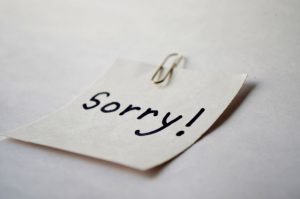 Remember that old saying, “Love means never having to say you’re sorry”? A bigger lie was never uttered! Healthy relationships — both romantic ones and friendships — are all about saying sorry when someone goofs. “Apologies are important because they show you’re taking the other person’s feelings into consideration,” explains Julia DeVillers, author of the teen advice book Girlwise. “An apology is a way of showing respect and showing you care.”
Remember that old saying, “Love means never having to say you’re sorry”? A bigger lie was never uttered! Healthy relationships — both romantic ones and friendships — are all about saying sorry when someone goofs. “Apologies are important because they show you’re taking the other person’s feelings into consideration,” explains Julia DeVillers, author of the teen advice book Girlwise. “An apology is a way of showing respect and showing you care.”
The Deed
What merits an apology? Anything you’ve done that someone considers hurtful or harmful to your relationship. Apologies aren’t so much about figuring out who was right and who was wrong as they are about reconnecting and mending a break in a relationship. Your words are for bridging that gap.
The Timing
The best time for apologies is as soon as you realize there’s a problem. “That way the other person doesn’t sit around feeling hurt or angry for longer than she or he needs to,” explains DeVillers.
Although an immediate apology is generally best, sometimes you might need time to calm down or to think about what happened. Or you may need to arrange private time. It’s helpful to tell the other person there’s a chat coming: “I know we need to talk. Can we meet after school?”
The Right Stuff
A good apology means
- recognizing you’ve upset someone
- taking responsibility for your actions and voicing it: “I know you were hurt when I … “
- explaining yourself: “I wasn’t trying to upset you, I only wanted to … “
- saying how sorry you are for the pain you caused: “I really wish that I hadn’t made you feel that way … “
- offering to make it up: “I’ll try to never do that again” or “Is there anything I can do to make up for this?”
- mending your ways: Make good on your promises to never “do that again.” Apologies are meaningless unless you back them up with actions.
Apologies to Apologize For
If you’ve followed the above guidelines, you’re on the right track to making amends, unless you stumble with these apology no-nos:
- Insincerity. No matter what you’re actually saying, eye rolling, joking inappropriately, or using a sarcastic voice can cancel out any note of regret, and may only make the situation worse.
- The wrong P.S. DeVillers reminds us that adding such comments as ” … but I don’t know why you’re making such a big deal out of it” is not helpful to the mending process.
- Putting the responsibility elsewhere. When you blame someone else for the problem, it’s not really an apology.
Why It’s So Hard
We’ve all been there — knowing we should apologize, and hating it. Apologies can be difficult. You might feel embarrassed about what happened. Or you could feel clueless about how to apologize. Maybe you think you’ll lose face by admitting you’ve done something wrong.
In these cases, it may help to remind yourself that everyone makes mistakes. Concentrate on how you’d feel if the situation were reversed. And focus on the true reason for an apology — relationship reconnection!















